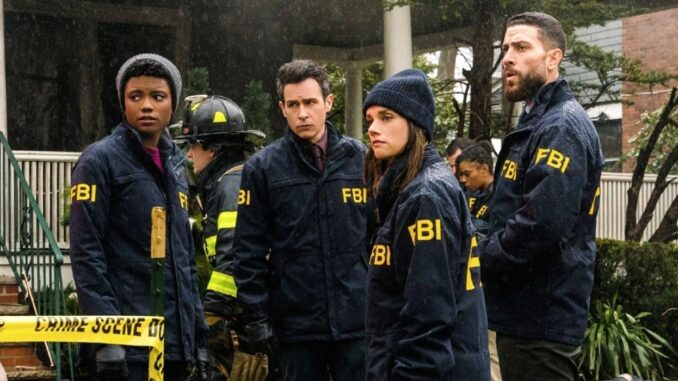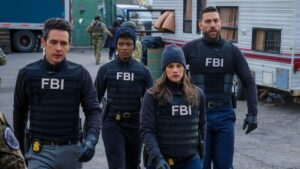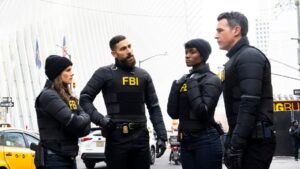
Last night’s triple season premiere confirms that the “FBI” franchise is the weakest pillar of Dick Wolf’s procedural TV empire.
When did the franchise-ification of TV procedures start getting out of hand? Was it when NBC started dedicating a whole night to shows set in Chicago? When Law & Order tried a true crime spinoff? When the producers of NCIS realized the US Navy has a field office in Australia?
Frankly, we may have hit peak procedural with the three-hour block of TV that CBS has dubbed “the FBIs.” Before the first season of FBI had finished airing in 2019, CBS commissioned a pilot for FBI: Most Wanted, which joined the network’s line-up in 2020. FBI: International followed in 2021. Say what you will about the various versions of NCIS, Law & Order, and CSI, but there has been a somewhat organic progression to those franchises, with each new variation debuting after an earlier one is firmly established. By contrast, the FBIs, as a concept, feel a bit… forced?
Clearly the network knows what it’s doing. The three FBIs are incredibly popular, with FBI in particular consistently landing toward the top of the weekly Nielsen ratings. But it’s hard to see why. All three shows returned to the air last night, beginning their sixth, fifth, and third seasons, respectively. Collectively, they delivered a dreary hash of violence and jargon, spiced up with a little politics, delivered by casts that mostly lack the charisma of those headlining the other procedural powerhouses.
The OG FBI came out of the gate the hardest, kicking off its season with an actual shocking moment. The episode opens with a bus-bombing in New York City, prompting an investigation which leads the agents from the FBI’s local branch office to a Somali restaurant frequented by a terrorist cell. When agents Wallace (Katherine Renee Kane) and Hobbs (Roshawn Franklin) pose as customers, Hobbs—a recurring character on the show since Season 2—gets shot and killed by the FBI’s prime bombing suspect, touching off a desperate manhunt by an agency grappling with their own anger and grief.

After that tense restaurant scene, though, the rest of the episode devolves into agents running around the streets with guns drawn, wearing vests emblazoned with “FBI.” Meanwhile, back at the office, the big boss Jubal Valentine (played by Jeremy Sisto, still this show’s best-known actor) tries to convince everyone that Hobbs would’ve wanted them to keep working. One brief moment of actual emotion gives way to something more exhaustingly frenetic.
There’s a similar vibe to the FBI: International Season 3 premiere, which picks up in the immediate aftermath of last season’s cliffhanger finale, which ended with a bomb going off in Budapest, leaving the fate of several FBI agents in doubt. Throughout the episode, the international “Fly Team” still bears the scars and bruises from the blast, as they pursue a woman who’d been working undercover with foreign arms dealers while posing as a travel blogger.
Unlike in FBI, everyone on International survives the hour (though Special Agent Jamie Kellett, played by original cast-member Heida Reed, does tender a surprise resignation in the final act, followed by a sentimental goodbye scene at a European train station). Just as in FBI, though, most of the episode is filled with flatly staged chases and shootouts, punctuated by frequent scenes of agents staring at computer screens and speaking sternly into phones.
The main thing FBI and FBI: International have in common is a sense of overwhelming mayhem, impossible for even the most diligent law enforcement officer to contain. The FBI episode even ends with the case unresolved and Hobbs’ murder unavenged, prompting Valentine to reassure Wallace that, “We’re the FBI. We don’t forgive and we don’t forget.” (Depending on viewers’ political persuasions, they may not find this thought so comforting.)
The FBIs are part of Law & Order producer Dick Wolf’s TV empire, but they lack the clear, concise storytelling that distinguishes the original L&O and its spinoff SVU (at least in their earlier seasons). The cases are complicated and grindingly serious, given that the fate of the nation is often at stake. The score is incessant and monotonously somber across all three shows. And a starting number of the action scenes end with a suspect (or someone who may be a suspect) getting shot dead.

There are some elements to the FBIs that set them apart from Wolf’s Law & Order and Chicago franchises—aside from characters tossing around very official-sounding phrases like “Let me read you in.” The locations in each of the FBI shows are more eclectic, since the agency’s business takes them all over the map. (Their respective HQs, however, have the generic “high-tech” look of an NCIS.)
The stories are also ripped from the headlines in a somewhat different way, tied more to major crimes than tabloid scandals. After the bus-bombing in the FBI premiere, for example, the agents initially wonder if it has something to do with Israel and Hamas. And looks in the FBI: Most Wanted Season 5 premiere, what to be a fairly routine murder case involving a government employee with a high security clearance ends up leading to an anti-government militia planning a bombing.
Oddly, though, the main thing that distinguishes FBI: Most Wanted from its sister shows is that its cast is so accomplished. The team on Most Wanted is led by Special Agent Remy Scott, played by Dylan McDermott, and he’s joined this season by Special Agent Nina Chase, played by For All Mankind’s Shantel VanSanten. Oscar-nominated Whale Rider star Keisha Castle-Hughes has been in the cast since the beginning, playing the resident computer expert. It’s like a throwback to the heydays of Law & Order, when both the regular cast and the special guest stars were formidable actors.
That cast isn’t enough to make Most Wanted feel special, though. Unlike the better TV procedures, the FBIs are pure busywork, rarely challenging the audience or offering deep insights into how federal law enforcement works. Any given episode may be diverting for a few minutes at a time, or maybe even for a whole hour. But with their mostly interchangeable plots and heroes, these shows are better at killing time than they are at making sense of a messy world.